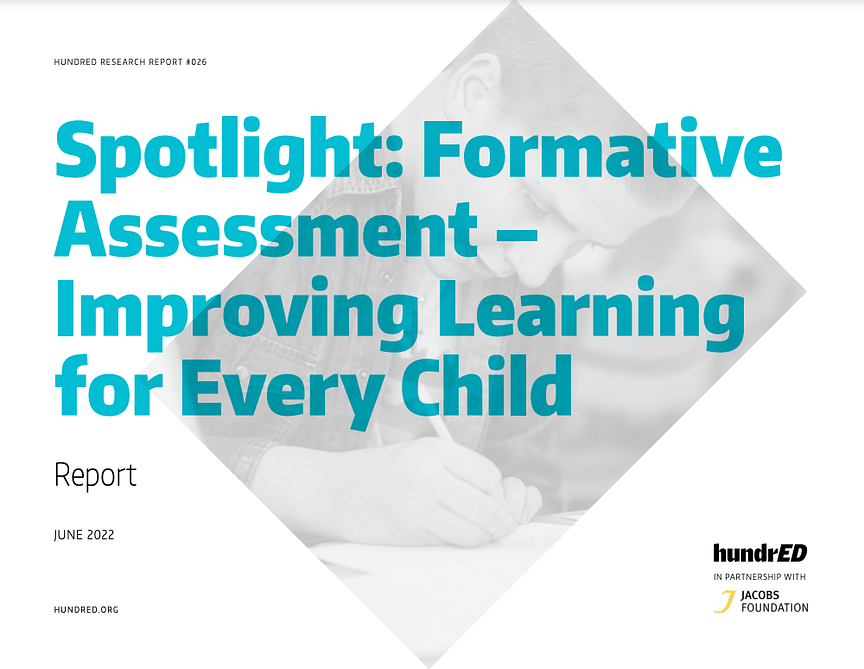Andrade, Heidi L. 2009. “Students as the Definitive Source of Formative Assessment: Academic Self-Assessment and the Self-Regulation of Learning. “ In Handbook of Formative Assessment, edited by Heidi Andrade, Gregory J. Cizek, pp 102-117. Routledge.
Baccalaureate, International. 2021. Comparative Judgement as a Peer Feedback Tool.
Black, Paul and Dylan Wiliam. “Developing the Theory of Formative Assessment.” Educational Assessment, Evaluation and Accountability (Formerly: Journal of Personnel Evaluation in Education) 21, no. 1 (February): 5–31. https://doi.org/10.1007/S11092-008-9068-5
Declercq, Bart, Ferre Laevers, and Julia Moons. 2012. A Process-Oriented Monitoring System for Early Years. CEGO Publishers; Leuven.
Dixson, Dante D., and Frank C. Worrell. 2016. “Formative and Summative Assessment in the Classroom.” Theory Into Practice 55, no. 2: 153–59. https://doi.org/10.1080/00405841.2016.1148989
Dolin, Jens, Paul Black, Wynne Harlen, and Andrée Tiberghien. 2018. “Exploring Relations Between Formative and Summative Assessment.” In Transforming Assessment: Through an Interplay Between Practice, Research and Policy, edited by Jens Dolin and Robert Evans, 53–80. Cham: Springer International Publishing. https://doi.org/10.1007/978-3-319-63248-3_3
Franco, Ashleigh. 2020. “Not All Finns Think Alike: Varying Views of Assessment in Finland.” International Education Studies 13, no. 1: 1-10. https://doi.org/10.5539/ies.v13n1p1
HundrED. 2022. “Webinar | Formative Assessment: How to Prioritise Children’s Learning & Wellbeing over Testing.” Oct 22, 2022. https://www.youtube.com/watch?v=7ghcRceL8rs&t=847s
SEAMEO INNOTECH. 2015. Assessment Systems in Southeast Asia: Models, Successes and Challenges. Quezon City: SEAMEO INNOTECH Regional Education Program.
Kapambwe, William M. 2010. “The implementation of school based continuous assessment (CA) in Zambia.” Educational Research and Reviews 5, no. 3 (March): 99-107.
Leroy, Lieve Mieke R., Van Phuc Le, Wouter Boesman, and Filip Lenaerts. 2021. “Talking With Children in Multilingual Preschools in Central Vietnam.” Childhood Education 97, no. 4 (July): 24–33. https://doi.org/10.1080/00094056.2021.1951544
McManus, Sarah. 2008. “Attributes of Effective Formative Assessment.” Washington, DC: Council for Chief State School Officers.
Mkimbili, Selina, and Septimi Kitta Reuben Kitta. 2020. “The rationale of continuous assessment for development of competencies in Tanzania Secondary Schools.” Advanced Journal of Social Science 6, no. 1: 64-70. https://doi.org/10.21467/ajss.6.1.64-70
Mondal, Ajit, and Jayanta Mete. “Continuous and Comprehensive Evaluation—An Appraisal.” Issues and Ideas in Education 1, no. 2 (September): 121-138. https://doi.org/10.15415/iie.2013.12008
National Council of Educational Research and Training. (n.d.) “NEP 2020, Assessment Reforms.”
National Education Association. 2020. “History of Standardized Testing in the United States.” National Education Association. June 25, 2020.
Nieminen, Juuso Henrik, Päivi Atjonen, and Ana Remesal. 2021. “Parents’ beliefs about assessment: A conceptual framework and findings from Finnish basic education.” Studies in Educational Evaluation 71 (December): 101097. https://doi.org/10.1016/j.stueduc.2021.101097
Prashanti, Eachempati, and Komattil Ramnarayan. 2019. “Ten Maxims of Formative Assessment.” Advances in Physiology Education 43, no. 2 (June): 99–102. https://doi.org/10.1152/advan.00173.2018
Puad, Lalu Mohammad Abid Zainul, and Karen Ashton. 2021. “Teachers’ views on classroom-based assessment: an exploratory study at an Islamic boarding school in Indonesia.” Asia Pacific Journal of Education 41, no. 2: 253-265. https://doi.org/10.1080/02188791.2020.1761775
Raman, Raghu, and Prema Nedungadi. 2010. “Adaptive learning methodologies to support reforms in continuous formative evaluation.” In 2010 International Conference on Educational and Information Technology, vol. 2, pp. V2-429. IEEE. https://doi.org/10.1109/iceit.2010.5607608
Rea-Dickins, Pauline. 2007. “Classroom-Based Assessment: Possibilities and Pitfalls.” In International Handbook of English Language Teaching, edited by Jim Cummins and Chris Davison, 505–20. Boston, MA: Springer US. https://doi.org/10.1007/978-0-387-46301-8_36
Scriven, Michael. 1967. “The Methodology of Evaluation.” In Perspectives of Curriculum Evaluation, AERA Monograph Series on Curriculum Evaluation, edited by R. Tyler, R. Gagné and M. Scriven , 39-83. Chicago: Rand McNally.
Shepard, Lorrie A. 2009. “Commentary: Evaluating the Validity of Formative and Interim Assessment.” Educational Measurement: Issues and Practice 28, no. 3 (Fall): 32–37. https://doi.org/10.1111/j.1745-3992.2009.00152.x
Sidhu, Gurnam Kaur, Sarjit Kaur, and Lee Jia Chi. 2018. “CEFR-aligned school-based assessment in the Malaysian primary ESL classroom.” Indonesian Journal of Applied Linguistics 8, no. 2 (September): 452-463. https://doi.org/10.17509/ijal.v8i2.13311
Simola, Hannu, Risto Rinne, Janne Varjo, Hannele Pitkänen, and Jaakko Kauko. 2009. “Quality assurance and evaluation (QAE) in Finnish compulsory schooling: a national model or just unintended effects of radical decentralisation?.” Journal of Education Policy 24, no. 2: 163-178. https://doi.org/10.1080/02680930902733139
Tien, Nguyen Hoang, Duong Thi Anh, Mai Van Luong, Nguyen Minh Ngoc, and Nguyen Thanh Vuong. 2020. “Formative assessment in the teacher education in Vietnam.” Journal of Hunan University Natural Sciences 47, no. 8.
Wiliam, Dylan. 2011. “What Is Assessment for Learning?” Studies in Educational Evaluation, Assessment for Learning, 37, no. 1 (March): 3–14. https://doi.org/10.1016/j.stueduc.2011.03.001


